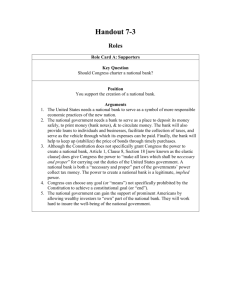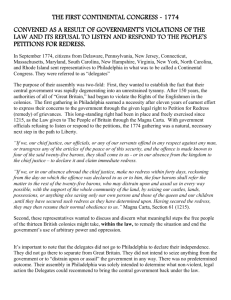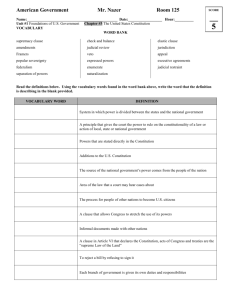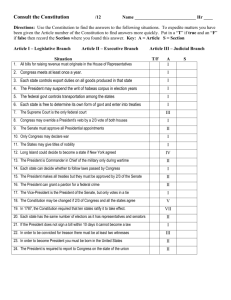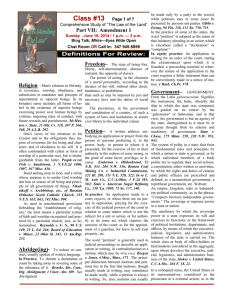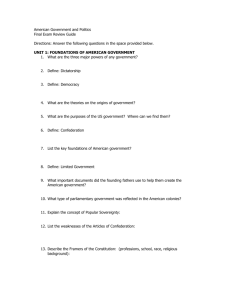THE PROBLEM - We The People Foundation
advertisement
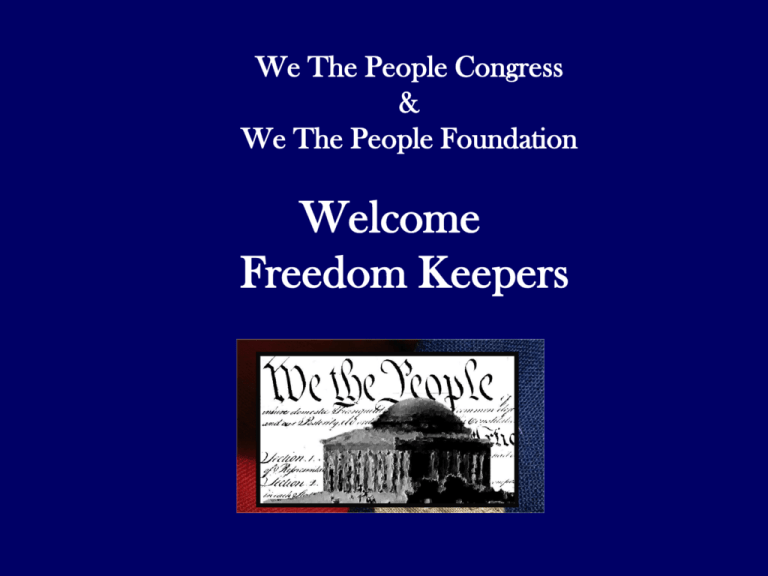
We The People Congress & We The People Foundation Welcome Freedom Keepers The Articles of Freedom The Profound Plan to Peacefully Restore the Constitution of America Presenter: Bob Schulz Chairman, We The People The Problem THE PROBLEM The following violations of the Constitution have challenged our Constitutional Republic and Her People to Its core. • • • • • • • • • • Meddling in the internal affairs of other countries Police State that is repugnant to the Fourth Amendment Undeclared wars Private / Corporate bailouts i.e., corporate welfare), A fiat currency Bills of Credit / Federal Reserve System Expenditures for activities that are not enumerated Fraudulently ratified 16th Amendment Direct, un-apportioned taxes on labor Judicial system that refuses to consider the evidence www.GiveMeLiberty.org The Problem THE PROBLEM (continued…) • • • • • • • • Unenforced Immigration laws / Failure to “faithfully execute” the laws The President’s father was not an American citizen Counting our votes in secret by machine No well-regulated state militias & Federal gun control laws International treaties, contracts and relationships with foreign entities Private land seizures for private purposes Government mandated / provided Health Care Money Legislations / Bills originating in the Senate www.GiveMeLiberty.org The Solution THE SOLUTION The First Amendment: “Congress shall make no law respecting an establishment of religion, or prohibiting the free exercise thereof; or abridging the freedom of speech, or of the press; or the right of the people peaceably to assemble, and to petition the Government for a redress of grievances.” The meaning of the last ten words: If the People have evidence that government officials are violating the Constitution, they can Petition the Government for a Redress of the Grievance. The officials have an obligation to respond. If the Government does not respond, the People have the Right of Enforcement.[1] [1] It is well settled in American Jurisprudence that if anyone has an obligation to respond and he fails to do so, his silence amounts to admission. It is also well settled that any Right that is not enforceable is not a Right – that is, with every Right there is a Remedy. www.GiveMeLiberty.org However, the Constitution cannot defend itself. It is the duty of the People to defend it. The People Have Petitioned THE PEOPLE HAVE PETITITONED THE GOVERNMENT FOR REDRESS OF GRIEVANCES: VIOLATIONS OF THE CONSTITUTION WE HAVE PETITIONED THE JUDICIARY: • • • • Mexican Peso bailout Bombing of the Federal Republic of Yugoslavia Bailiouts of AIG and private financial corporations Counting votes in secret v. voting Rights WE HAVE PETITIONED ALL MEMBERS OF CONGRESS & THE PRESIDENT” • • • • • • • • • Iraq Resolution v. war powers clauses Federal Reserve System v. money clauses Patriot Act v. privacy clauses Direct, Un-apportioned Tax on Labor and Withholding v. tax clauses Gun Control Laws v. 2nd amendment Illegal Immigration v. faithfully execute clause Foreign aid v. general welfare clause and enumerated powers North American Union v. sovereignty clause of the DoI www.GiveMeLiberty.org Parental citizenship v. natural born citizen clause Chapter 61 of Magna Carta (1215) FIRST CLUE RE MEANING OF LAST TEN WORDS OF THE ACCOUNTABILITY CLAUSE “If we, our chief justice, our officials, or any of our servants offend in any respect against any man, or transgress any of the articles of the peace or of this security, and the offence is made known to four of the said twenty-five barons, they shall come to us - or in our absence from the kingdom to the chief justice - to declare it and claim immediate redress. If we, or in our absence abroad the chief justice, make no redress within forty days, reckoning from the day on which the offence was declared to us or to him, the four barons shall refer the matter to the rest of the twenty-five barons, who may distrain upon and assail us in every way possible, with the support of the whole community of the land, by seizing our castles, lands, possessions, or anything else saving only our own person and those of the queen and our children, until they have secured such redress as they have determined upon. Having secured the redress, they may then resume their normal obedience to us.” 1689 English Bill of Rights SECOND CLUE RE MEANING OF LAST TEN WORDS OF THE ACCOUNTABILITY CLAUSE The 1689 Declaration of Rights proclaimed, “[I]t is the Right of the subjects to petition the King, and all commitments and prosecutions for such petitioning is illegal.”[1] [1] This was obviously a basis of the “shall make no law abridging the right to petition government for a redress of grievances” provision of our Bill of Rights. www.GiveMeLiberty.org 1774 Continental Congress THIRD CLUE RE MEANING OF LAST TEN WORDS OF THE ACCOUNTABILITY CLAUSE In 1774, the same Congress that adopted the Declaration of Independence unanimously adopted an Act in which they gave meaning to the People’s Right to Petition for Redress of Grievances and the Right of enforcement as they spoke about the People’s “Great Rights.” Quoting: “If money is wanted by rulers who have in any manner oppressed the People, they may retain it until their grievances are redressed, and thus peaceably procure relief, without trusting to despised petitions or disturbing the public tranquility.”[1] [1] "Continental Congress To The Inhabitants Of The Province Of Quebec." Journals of the Continental Congress 1774, Journals 1: 105-13. 1775 Thomas Jefferson FOURTH CLUE RE MEANING OF LAST TEN WORDS OF THE ACCOUNTABILITY CLAUSE In 1775, just prior to drafting the Declaration of Independence, Jefferson gave further meaning to the People’s Right to Petition for Redress of Grievances and the Right of enforcement. Quoting: “The privilege of giving or withholding our moneys is an important barrier against the undue exertion of prerogative which if left altogether without control may be exercised to our great oppression; and all history shows how efficacious its intercession for redress of grievances and reestablishment of rights, and how improvident would be the surrender of so powerful a mediator.”[1] [1] Thomas Jefferson: Reply to Lord North, 1775. Papers 1:225. www.GiveMeLiberty.org 1776 Declaration of Independence FIFTH CLUE RE MEANING OF LAST TEN WORDS OF THE ACCOUNTABILITY CLAUSE In 1776, the Declaration of Independence was adopted by the Continental Congress. The bulk of the document is a listing of the Grievances of the People had against a Government that had been in place for 150 years. The final Grievance on the list is referred to by scholars as the “capstone” Grievance. The capstone Grievance was the ultimate Grievance, the Grievance that prevented Redress of these other Grievances, the Grievance that caused the People to non-violently withdraw their support and allegiance to the Government, and the Grievance that eventually justified War against the King, morally and legally. Thus, the Congress gave further meaning to the People’s Right to Petition for Redress of Grievances and the Right of Enforcement. Quoting the Capstone Grievance: www.GiveMeLiberty.org 1776 Declaration of Independence (DOI continued…) “In every stage of these Oppressions We have Petitioned for Redress in the most humble terms. Our repeated Petitions have been answered only by with repeated injury. A Prince, whose character is thus marked by every act which may define a Tyrant, is thus unfit to be the ruler of a free people… We, therefore…declare, That these United Colonies… are Absolved from all Allegiance to the British Crown….”[1] [1] Declaration of Independence, 1776 www.GiveMeLiberty.org 1784 New Hampshire SIXTH CLUE RE MEANING OF LAST TEN WORDS OF THE ACCOUNTABILITY CLAUSE New Hampshire Constitution: [Art.] 10. [Right of Revolution.] “Government being instituted for the common benefit, protection, and security, of the whole community, and not for the private interest or emolument of any one man, family, or class of men; therefore, whenever the ends of government are perverted, and public liberty manifestly endangered, and all other means of redress are ineffectual, the people may, and of right ought to reform the old, or establish a new government. The doctrine of nonresistance against arbitrary power, and oppression, is absurd, slavish, and destructive of the good and happiness of mankind.”[1] [1] Added June 2, 1784 and has remained unchanged. 1836 U.S. Congress SEVENTH CLUE RE MEANING OF LAST TEN WORDS OF THE ACCOUNTABILITY CLAUSE[1] Under Article I, Section 5 of the Constitution, "Each House may determine the Rules of its Proceedings." 294 The First Amendment, however, provides that, "Congress shall make no law ... abridging ... the right of the people ... to petition the Government for a redress of grievances." 295 Those two sections ofthe Constitution came into direct conflict in the years 1836 to 1844, as the House of Representatives attempted to quell the rising number of abolition petitions its members had been receiving. The attempts to stifle the petitions became known as the gag rule or gag law. For eight years, the existence of the rule was a source of tremendous controversy in the House and the nation. 296 Abolitionism was the reason for the gag rule. The rule was the reaction of southern congressmen who felt that the South could no longer bear the insults contained in the language and content of abolition petitions. Designed to staunch the flow of such petitions to the House, it was sweeping in its breadth 1836 U.S. Congress (Continued…) As first adopted on May 26, 1836, the rule and its preamble were to signal abolitionists that the House of Representatives was not going to consider the subject of the abolition of slavery and therefore it was superfluous to continue the attempts to agitate the matter. Resolved, That all petitions, memorials, resolutions, propositions, or papers, relating in any way, or to any extent whatever, to the subject of slavery, or the abolition of slavery, shall, without being either printed or referred, be laid upon the table, and that no further action whatever shall be had thereon. 299 This seminal resolution was to be re-adopted in nearly identical forms during the beginning of each session of Congress until finally made a standing rule in 1840. 300 The standing rule was not repealed until the opening of the second session of the Twenty-eighth Congress, on the resolution offered by John Quincy Adams. 301 [1] Fordham Law Review May, 1998, 66 Fordham L. Rev. 2153 . ARTICLE: THE VESTIGIAL CONSTITUTION: THE HISTORY AND SIGNIFICANCE OF THE RIGHT TO PETITION. Gregory A. Mark 2010: The Right to Enforce THE CONSTITUTION CANNOT DEFEND ITSELF. YOU MUST DEFEND THE CONSTITUTION. Critical Mass The Articles of Freedom Continental Congress 2009 AOF: The Profound Plan to Restore the Constitution of America It’s Time to Secure Our Right of Accountability. It’s Time to Peacefully Exercise Our Right of Enforcement The Articles of Freedom

